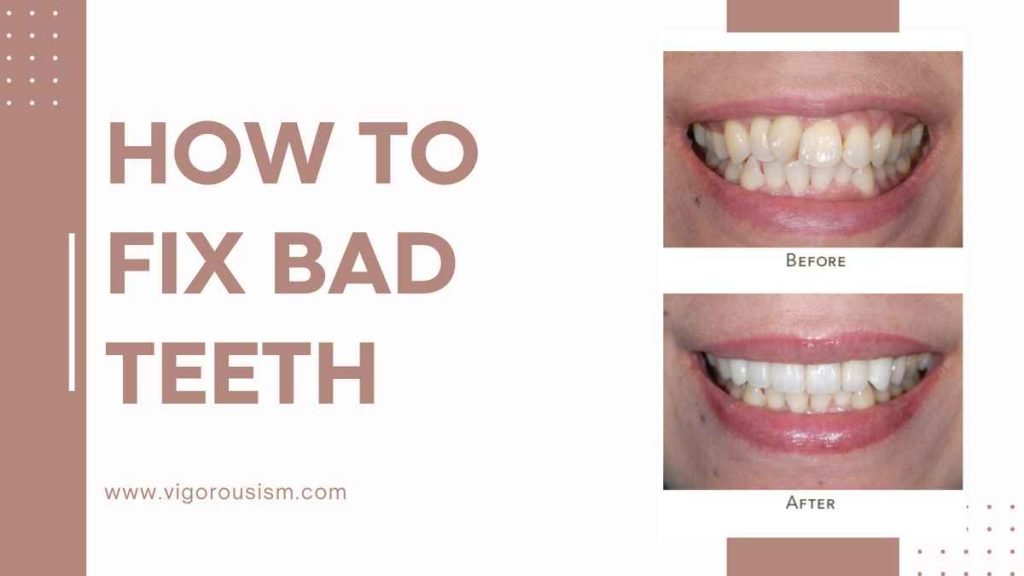How to Fix Bad Teeth! Are you tired of hiding your smile because of bad teeth? Don’t worry; you’re not alone. Many people face dental issues that affect their confidence and overall oral health. But the good news is, there are effective ways to fix bad teeth and restore your smile. In this comprehensive guide, we will explore How to Fix Bad Teeth. Here we’ll explore the best ways to restore bad teeth, common mistakes to avoid, and valuable tips and tricks. Let’s embark on a journey to a healthier, brighter smile!
Table of Contents
What Are Bad Teeth?
Bad teeth refer to dental problems that can range from discoloration and stains to cavities, chipped or cracked teeth, and even missing teeth. These issues can be caused by poor oral hygiene, unhealthy diet, smoking, or genetic factors. Bad teeth not only affect your appearance but also lead to pain, discomfort, and difficulty in chewing. Addressing these problems is crucial for your oral health and self-esteem.
How to Fix Bad Teeth: A Step-by-Step Guide
Here you can check the step-by-step guide about How to Fix Bad Teeth:
Total Time: 15 minutes
Consultation with a Dentist
Before you embark on any dental procedures, it’s essential to consult a dentist. They can assess your condition and recommend the most suitable treatments.
Teeth Cleaning and Whitening
Professional dental cleaning removes plaque and tartar, enhancing your teeth’s appearance. Teeth whitening procedures, like in-office bleaching or at-home kits, can brighten your smile.
Dental Fillings and Bonding
For cavities and minor damage, dental fillings and bonding are used. Fillings replace decayed tooth material, while bonding repairs chips and cracks with a tooth-colored resin.
Crowns and Veneers
Crowns cover damaged teeth entirely, restoring their shape and strength. Veneers are thin shells attached to the front of teeth to improve their appearance.
Orthodontic Treatments
Braces or clear aligners can fix misaligned teeth. Orthodontic treatments not only enhance aesthetics but also improve oral health.
Dental Implants and Bridges
Implants are artificial tooth roots, providing a sturdy foundation for replacement teeth. Bridges are prosthetics that bridge the gap created by missing teeth.
Best Ways to Restore Bad Teeth
Maintain Good Oral Hygiene: Regular brushing, flossing, and mouthwash use prevent tooth decay and gum disease, ensuring a healthier smile.
Healthy Diet and Hydration: A balanced diet rich in vitamins and minerals promotes strong teeth. Drinking plenty of water helps wash away food particles and bacteria.
Limit Sugary and Acidic Foods: Sugary and acidic foods erode tooth enamel. Limit their intake to protect your teeth from decay.
Regular Dental Checkups: Routine dental visits allow early detection of problems, enabling prompt treatment and preventing further damage.
Avoid Tobacco and Excessive Alcohol: Tobacco stains teeth and increases the risk of gum disease. Excessive alcohol consumption can lead to oral cancer. Avoiding these substances is essential for oral health.

Some Other Methods to Fix Bad Teeth
Oil Pulling
Oil pulling involves swishing oil in your mouth to remove bacteria and promote oral hygiene. Coconut oil is commonly used for this purpose.
Herbal Remedies
Some herbs like neem and clove have natural antibacterial properties. Products containing these herbs can aid in oral care.
Activated Charcoal
Activated charcoal is believed to absorb toxins and stains, although its effectiveness is a topic of debate among dental professionals.
Different Types of Bad Teeth
Discolored Teeth: Teeth discoloration can result from poor oral hygiene, smoking, or consuming staining substances like coffee and red wine.
Decayed Teeth: Tooth decay occurs when bacteria erode enamel, leading to cavities. Proper oral hygiene and regular dental checkups prevent decay.
Chipped or Cracked Teeth: Accidents or biting hard objects can cause teeth to chip or crack. Bonding, veneers, or crowns can restore their appearance.
Missing Teeth: Missing teeth can be due to injury or extraction. Dental implants, bridges, or dentures can replace them, ensuring proper chewing function.
Common Mistakes to Avoid
Ignoring Tooth Pain: Persistent tooth pain indicates an underlying issue. Ignoring it can worsen the problem, leading to more extensive and expensive treatments.
Overusing Whitening Products: Excessive use of whitening products can damage enamel and make teeth sensitive. Follow dental professional advice for safe whitening.
Neglecting Dental Visits: Regular dental checkups are crucial. Skipping appointments can result in undetected issues progressing to severe conditions.
Tips and Tricks for Healthy Teeth
Use a Soft-Bristled Toothbrush: A soft-bristled toothbrush is gentle on gums and enamel, preventing damage during brushing.
Brush Properly: Brush teeth for at least two minutes, covering all surfaces. Use fluoride toothpaste for effective cleaning.
Floss Daily: Flossing removes food particles and plaque between teeth, areas a toothbrush can’t reach.
Facts About Bad Teeth
Oral Health Reflects Overall Health: Oral health is interconnected with overall health. Poor oral hygiene can lead to systemic issues like heart disease and diabetes.
Enamel Is Irreplaceable: Tooth enamel, once eroded, cannot regenerate naturally. Protect it by maintaining good oral habits.
Teeth Are Unique: No two people have the same set of teeth. Your dental structure is as unique as your fingerprint.
Conclusion
In conclusion of How to Fix Bad Teeth, fixing bad teeth is not just about aesthetics; it’s about ensuring your overall well-being. By following proper oral hygiene, seeking timely dental care, and avoiding harmful habits, you can maintain a healthy, radiant smile. Remember, your smile is your most valuable accessory; take care of it, and it will enhance your confidence and charm. Here you can checkout that How to Brush Teeth After Extraction.
FAQs About How to Fix Bad Teeth
Can bad teeth be fixed without a dentist’s help?
While some home remedies can aid oral hygiene, it’s essential to consult a dentist for proper evaluation and treatment of dental issues.
How often should I visit the dentist for checkups?
Regular dental checkups are recommended every six months. However, individuals with specific dental conditions may need more frequent visits.
Are teeth whitening procedures safe?
When performed by professionals, teeth whitening procedures are generally safe. Over-the-counter products should be used as per the instructions to prevent enamel damage.
Can chipped teeth repair themselves?
Chipped teeth cannot repair themselves. Dental bonding or veneers are common methods used to restore the appearance of chipped teeth.
Is it normal for gums to bleed while brushing?
Bleeding gums indicate gum disease and are not normal. It’s crucial to consult a dentist to address the underlying issue.
Can bad teeth affect speech?
Yes, misaligned or missing teeth can affect speech clarity. Dental treatments can help improve speech patterns.
What can I do to prevent bad breath caused by bad teeth?
Regular brushing, flossing, and using mouthwash can help prevent bad breath caused by dental issues. It’s also essential to clean the tongue and stay hydrated.


